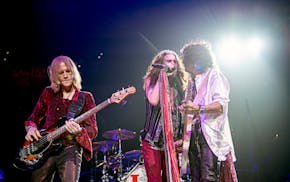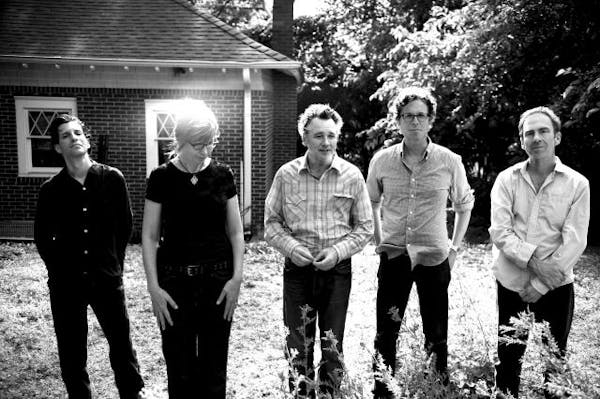"It's funny," Jayhawks co-leader Gary Louris said, "there was always a lot of time between records when we were still very active. Now, all of a sudden, there's all this material coming out after years of inactivity."
A band that always seemed to suffer from strange timing, the Minneapolis twang-rock heroes might finally be benefiting from coincidence as it sees four albums issued over the course of one unpredictably action-packed year -- a nice setup to the release of their all-new record this summer.
First came Lost Highway's reissue last summer of their little-heard 1986 eponymous debut, aka "The Bunkhouse Album." The run continued last week with Sony/Legacy's reissue of two of their best-remembered discs, 1992's "Hollywood Town Hall" and 1995's "Tomorrow the Green Grass," each bulked up with bonus tracks, photos and new liner notes.
The band's other chief singer/songwriter, Mark Olson, said the expanded editions prove "we really spent so much time and poured our soul into those records."
From one reissue that captured the little-band-that-could to two that show off what they did best, the Jayhawks will then quickly move on to releasing a record that demonstrates what they might have done had their mid-'90s lineup stayed intact.
The still-untitled new album, completed in November, will be the first Jayhawks disc with both Louris and Olson on it since 1995, when Olson quit the band. (Louris led it through eight more years and three more albums.) As was the case at their three First Avenue reunion shows last summer -- and will be when they return to the club Saturday and Sunday to wrap up a short tour behind the reissues -- the lineup is the same as when Olson bowed out, with bassist Marc Perlman, drummer Tim O'Reagan and keyboardist Karen Grotberg.
Talking by phone three weeks ago from Tucson, Ariz., where he was mixing the album, Louris confirmed that the timing of all this was mostly coincidental. Last summer's First Ave shows to promote the "Bunkhouse" record, he said, were "just kind of a love fest between the band and audience, and within the band. We realized we were still a great band."
Reissuing the early-'90s albums backs up their claim of "unfinished business," and the new one will drive it home, he said.
"It shows that we're not just a museum piece, but a living, breathing unit that still feels like it's on its game and can make a great record that stands next to the other ones."
In a separate phone interview from his home in Joshua Tree, Calif. -- where he moved in 1995 just before he quit the Jayhawks -- Olson put an exclamation point on Louris' statement.
"We've all stayed busy doing other things," he said. "Now we're back, and I think we're in a situation where we're really a better band. All of us can play music on any level now."
Here are some of the other sentiments they passed along, shared or otherwise.
On the arduous making of "Hollywood Town Hall" with producer George Drakoulias, who substituted session players for then-drummer Ken Callahan and kept the band in Los Angeles for several months.
Olson: We had all committed to leaving our jobs to go make this record, and we felt like we were never actually going to make it, just sit around for weeks and weeks. The good side of that was we spent a lot of time in the studio. We got an education out of it.
Louris: We were green. And we were a little scared because, remember, we had been trying for years to get a record contract. Nothing ever clicked. So all of a sudden, we finally got the call, and we were nervous. It was the big time. I think it's definitely fair to say Ken got the shaft. He was the guy who had to go first in the studio. On the first day, it was just, "OK, Ken, go!"
On the "Town Hall" cover photo shoot, which gave the album its name.
Louris: We just accidentally drove into this place 15 miles outside of Minneapolis called Hollywood, Minnesota, and drove by this kind of iconic-looking building that said "Hollywood Town Hall" on the front. It was sort of fitting, after spending four months in Hollywood, California.
Olson: We all kind of have this drawn look about us, because it was damn cold. So it was a true Minnesota picture in a way. It captured a bit of the feeling and showed that we were from a certain place, and it reflected our writing in certain ways.
On the evolution going into "Tomorrow the Green Grass."
Olson: We had learned some things in the studio, and we expanded the songwriting to the level of having more space. That's the big difference I see: More space. "Hollywood Town Hall" is a bit thick.
Louris: ["Town Hall"] is where we really found our sound, and it's one sort of constant sound. "Tomorrow the Green Grass" leans more in the pop and experimental direction. We stretched our boundaries. Also, with that record, Karen had really become a major part of the band.
On "Blue," the pinnacle of "Green Grass" and maybe the band's entire canon, but only a minor radio hit.
Louris: That was the song, anytime we played it before the record came out, people would come up to us after the show and ask, "What was that one song?" It sounded familiar to them right away, even though I think it was a pretty original song -- except for the title.
Olson: In the end, I think it really didn't become a bigger single just because it was sticky in musical terms for that era, the grunge era. It didn't touch the radio people the right way, however that all worked then. We wanted to write classic songs. We listened to Dylan, Neil Young, Nick Drake, the Band. We simply tried to write songs like they did, hoping they would last. Well, mission accomplished [laughs].
On the so-called "Mystery Demos," heavily bootlegged acoustic tracks issued as a bonus CD with "Green Grass."
Louris: They really were a mystery, because we had a hard time figuring out where and when some of them were made. There's something like 47 songs total. They were made simply to lay out what songs we had to choose from, going into making "Tomorrow the Green Grass." I think of Dylan going to his publisher's office singing into a reel-to-reel. That's what we were doing.
Olson: I think there's a whole other album in there. In fact, Gary and I went on to use a number of those songs on [2008's duo album "Ready for the Flood"], and they had been on Golden Smog records. I had one on [his solo record] "Salvation Blues." It's a nice, big document dump that I think people will enjoy."
On the full-fledged return with the new album.
Olson: I see it like we've still been playing music all these years, just in different ways. We've accumulated all this different experience, and we applied all that to this new record. It's a whole different music environment now than when we were around the first time, so we'll see what happens, but either way I really think we're gonna enjoy ourselves.
Louris: We've always been an unusual band. We've never been of a particular period. And I can't think of another band that has come back from hiatus and made its best album, but I really think we've done it.
Chris Riemenschneider • 612-673-4658 • Follow him on Twitter: @ChrisRstrib
Ludacris and T-Pain to stand up together at Minnesota State Fair grandstand in 2024

City of Minneapolis launches new census to better plug in to its music scene
Prince's Revolution to reunite for 'Purple Rain' 40th anniversary gigs at First Avenue

Aerosmith's postponed Xcel Center gig is back on for January 2025


